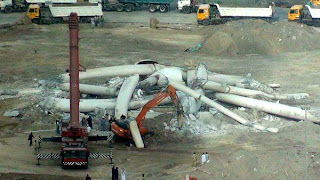In a
recent
CFR article, Ed Husain argued that Syria’s ongoing civil war is
overshadowing the infiltration of Al Qaeda into the rebel forces, and they are now
winning the ideological battle for the revolution. Although acknowledged by
western policymakers including CIA Director Leon Panetta, the presence of the
terrorist group has not stopped leaders such as French President Francois
Hollande from declaring that they would recognize any interim government formed
by the Syrian government. Such a move would completely disregard the fact that
no interim government could be formed without the support of the
well-organized, amply funded and armed Syrian Al Qaeda.
As
early as May, Panetta admitted that the U.S. believes that Al Qaeda has
established a solid presence in Syria among the ranks of the Free Syrian Army, or FSA, but that the nature of their movements
and organization were still cloaked in mystery. The group believed to be behind
the Al Qaeda attacks of recent months calls itself Jabhat al-Nusra l’al-Ahl
al-Sham, or Victory Front of the Syrian People. Al-Sham is the traditional name
for the region encompassing Syria, Lebanon, Palestine, Jordan and Israel, a
reference to the group’s long-term goal of redrawing the regional borders
starting with a liberated Syria.
An FSA fighter on the streets of Homs. Photo by Bo Yaser.
The
term “liberation” is, of course, misleading when it comes to Al Qaeda. What
“liberation” means to them is a casting off of both Asad and Western influence,
to be replaced with a strict form of Sunni Islamic law, a totalitarian
religious government, and a continuation of jihad waged against countries like
Israel. Jabhat al-Nusra benefits from many of the same circumstances that
allowed Al Qaeda to gain a foothold in Afghanistan in the 1980s: a welcoming
population, ideological appeal, a steady supply of weapons and money from Arab
donors, a pre-existing conflict in need of recruits, and Western reluctance to
interfere. Much like the Taliban discovered their regime could not succeed
without the Al Qaeda mujahideen, any interim government will find itself unable
to dislodge the extremist elements within the opposition once they have become
a crucial part of its operations.
According
to Husain, the group had already conducted 66 attacks in Syria by June,
including many car bombings that the Asad regime was quick to publicize for the
international community as terrorist attacks. The global community for its part
is even less likely to give aid to a Syrian opposition it views as infiltrated
by extremist Salafi jihadists. Overlapping political affiliations in Syria already
make any direct support of the opposition complicated at the very least; that
the likely outcome of such aid would see U.S. weapons in the hands of a group
like Al Qaeda precludes such support from becoming reality. After all, America
learned its lesson the hard way in Afghanistan when the mujahideen it had armed
against the Soviets became the terrorist group responsible for 9/11 and some of
the most fervently anti-American organizations on the planet. Many of the
Syrian jihadists are thought to be from Anbar Province in Iraq, and as such
they are not an unfamiliar enemy to the United States.
The
Syrian opposition itself is fully aware of how precarious its position is,
especially given that it will eventually need outside support to survive. It
has deliberately tried to hide the Al Qaeda-associated groups within its ranks
from the view of the media. When reporters discovered opposition soldiers
sporting Al Qaeda’s flag in a neighborhood in Damascus, they were ushered away
by opposition leaders before they could interview the fighters. The Free Syrian
Army has rejected videos and photos blatantly showing opposition soldiers
wearing Al Qaeda symbols and insignia.
Syrian opposition fighters stand behind an Al Qaeda flag.
Yet
the evidence is mounting that without Al Qaeda, the resistance would be nowhere
near as successful as it has been. Which
means that Jabhat al-Nusra has the power and the resources to demand a part in
whatever government emerges from the Syria conflict. While Western countries
have wasted no time disavowing Asad, they have been much slower to provide
concrete support to the opposition forces that desperately need it. In part,
the opposition can thank groups like Jabhat al-Nusra both for propping up the
rebellion, and also, perhaps, condemning it.










